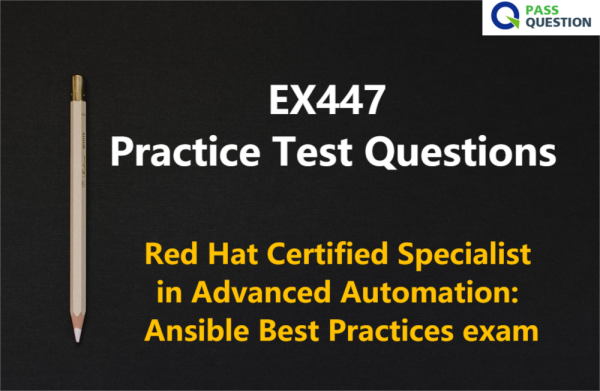EX447 Practice Test Questions - Red Hat Certified Specialist in Advanced Automation: Ansible Best Practices exam
If you are preparing for EX-447 Red Hat Certified Specialist in Advanced Automation: Ansible Best Practices exam, PassQuestion offers the EX447 Practice Test Questions according to the latest syllabus to ensure your success in first attempt with high scores.If you are going through all of our EX447 questions and answers, then you will be able to clear the RedHat EX447 exam on the first attempt. If you are using our EX447 Practice Test Questions, then you will be able to get a clear idea of the real exam scenario. It will help you succeed in the RedHat EX447 exam on the first attempt.

Red Hat Certified Specialist in Advanced Automation: Ansible Best Practices exam (EX447)
The Red Hat Certified Engineer Specialist in Advanced Automation: Ansible Best Practices exam (EX447) is a performance-based test of your knowledge and skill in managing multiple systems using Red Hat Ansible Engine and Red Hat Ansible Tower. By passing this exam, you become a Red Hat Certified Specialist in Advanced Automation: Ansible Best Practices, which also counts toward becoming a Red Hat Certified Architect (RHCA). This exam is based on Red Hat Enterprise Linux 8.0, Red Hat Ansible 2.8, and Red Hat Ansible Tower 3.5.
Audience for this exam
The Red Hat Certified Specialist in Advanced Automation: Ansible Best Practices exam will be of interest to anyone seeking to demonstrate a broader knowledge and understanding of Ansible best practices, applying Ansible in larger and more complex projects, and using Ansible Tower, including those in these roles:
Experienced Linux system administrators
DevOps engineers
Cloud administrators
Other IT professionals
Exam Topics
Understand and use Git
- Clone a Git repository
- Update, modify and create files in a Git repository
- Add those modified files back into the Git repository
Manage inventory variables
- Structure host and group variables using multiple files per host or group
- Use special variables to override the host, port, or remote user Ansible uses for a specific host
- Set up directories containing multiple host variable files for some of your managed hosts
- Override the name used in the inventory file with a different name or IP address
Manage task execution
- Control privilege execution
- Run selected tasks
Transform data with filters and plugins
- Populate variables with data from external sources using lookup plugins
- Use lookup and query functions to template data from external sources into playbooks and deployed template files
- Implement loops using structures other than simple lists using lookup plugins and filters
- Inspect, validate, and manipulate variables containing networking information with filters
Delegate tasks
- Run a task for a managed host on a different host, then control whether facts gathered by that task are delegated to the managed host or the other host
Install Ansible Tower
- Perform basic configuration of Ansible Tower after configuration
Manage access for Ansible Tower
- Create Ansible Tower users and teams and make associations of one to the other
Manage inventories and credentials
- Manage advanced inventories
- Create a dynamic inventory from an identity management server or a database server
- Create machine credentials to access inventory hosts
- Create a source control credential
Manage projects
- Create a job template
Manage job workflows
- Create a job workflow template
Work with the Ansible Tower API
- Write an API scriptlet to launch a job
Back up Ansible Tower
- Back up an instance of Ansible Tower
- TOP 50 Exam Questions
-
Exam
All copyrights reserved 2025 PassQuestion NETWORK CO.,LIMITED. All Rights Reserved.

